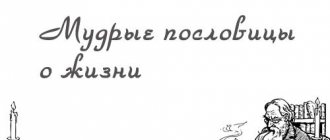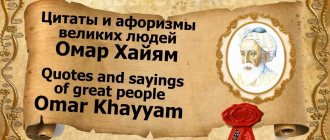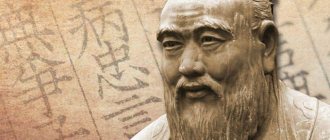For an essay on the Unified State Examination in the Russian language on the topic: “What is wisdom?” you will need arguments from literature and life. This topic is best suited for examination work, because while writing an essay you can rethink the meaning of wisdom in human life. However, simply expressing your thoughts is not enough; the student must clearly and clearly indicate his opinion about the problem raised. To do this, it is necessary to provide evidence: facts from life, history, fiction, explanations, justification, as well as statements. These evidences are called arguments in the essay.
The author's attitude to the problem
Wisdom is often understood as rich life experience, but experience can be different and is not always distinguished by wise decisions and actions. A wise person has a number of certain qualities: he must be serious, be able to approach any matter thoroughly, analyze what is happening and admit his mistakes. A truly wise person will never consider his opinion to be the only correct one. If he is faced with a problem, he listens to the judgments of others, and then makes a decision after weighing the pros and cons. But just the desire to become wise is not enough; you need to learn wisdom throughout your life. Life itself is a school of wisdom.
Sayings of the great Romans
The Roman Empire was famous not only for its conquests and gladiator battles. Many great citizens of Rome left the wisdom of ancient knowledge for the edification of their descendants:
- “When you run away from fate, you rush towards it” - Titus Livius, historian. Probably, you shouldn’t resist in vain what life is pushing you towards.
- “It is inhuman not to extend a helping hand to someone who is falling” - Lucius Annaeus Seneca, Roman historian. After all, the concepts of morality and helping those in need have never been alien to people.
- “Life is short, but misfortune makes it longer” - Publilius Syrus, a former slave who became a popular mimetic poet of the era of Julius Caesar. Who else, if not a slave, knows about the sorrows of life.
- “If there is love in the world (and there is!), then it is not far from madness” - Marcus Cicero, the great commander and philosopher. Throughout the ages, lovers have done many strange things in the name of their feelings. And, fortunately, they will never stop doing this.
Arguments
- Wisdom consists, first of all, in careful judgment, in the ability to rely on knowledge, taking into account many facts.
- Wisdom is the highest thing a person can achieve.
- Wisdom is abstaining from unfounded assertions.
- Wisdom is more than just knowledge, it is a combination of skills, rich experience and restraint in judgment.
- A truly wise person is never completely sure of the irrefutability of his opinion.
- The wisdom of an individual is his personal experience, which he accumulated throughout his life.
- A wise person knows how to observe and reflect on what he sees.
- A wise person is careful in words and actions.
- Knowledge will never replace wisdom; these two concepts must complement each other.
- Wisdom does not necessarily come with age; you can live your whole life and never gain it.
Thoughts of religious figures of the East
For a long time, ministers of religion have tried to instruct people on the right path and not commit illegal acts. Many ancient wisdom about life, love and humility belong to outstanding servants of the faith:
- “Hatred can be ended not by hatred, but only by love” - Buddha.
- “If you have a problem, try to solve it. If you can’t solve it, then don’t make a problem out of it.” - Buddha.
- “Thousands of candles can be lit from a single one, and its life will not be shortened. Happiness will not decrease if it is shared” - Buddha.
- “A good deed is something that brings a smile of joy to another person’s face” - Prophet Muhammad.
- “There is no happiness equal to peace” - Prophet Muhammad.
Ancient wisdom says that any knowledge is priceless, the main thing is to be able to use it correctly. Even after centuries, the aphorisms of philosophers and prophets can help find a way out of a difficult situation or stop committing unworthy acts.
Epithets for the word “wisdom”
Absolute, ancient, boundless, bottomless, endless, biblical, God's, innate, main, spiritual, everyday, earthly, age-old, great, cheerful, universal, worldwide, high, deep, profound, ancient, decrepit, vital, everyday, earthly, serpentine, known, eternal, original, true, exceptional, bookish, false, human, world, centuries-old, silent, folk, heavenly, invisible, ineffable, inexhaustible, inexhaustible, inexhaustible, incomprehensible, extraordinary, extraordinary, undeniable, inhuman, general, special, special, genuine, practical, acquired, simple, Russian, superhuman, supernatural, sacred, holy, hidden, gray-haired, perfect, ancient, senile, strict, severe, mysterious, thousand-year-old, healing, philosophical, wonderful, alien, bright, clear.
Examples from fiction
- F.M. Dostoevsky "Crime and Punishment" .
The main character of the novel F.M. Dostoevsky's "Crime and Punishment" considered himself a wise man. He was concerned about the unfair structure of the world around him, and he decided to correct it. The student outlined his theory in the article “About Crime.” He was inspired by historical figures who became famous for stopping at nothing to achieve their goals, even breaking the law. Their example led Raskolnikov to the idea of dividing all people into two types: “trembling creatures” and “having the right.” Those who belonged to the second type were foreshadowed by an unusual fate. Those who had the right made great discoveries, made history, and led progress. For them there were no moral principles; they were not afraid of social principles. For the sake of a higher goal, one can even step over human life. This is exactly what Raskolnikov’s main idol, Napoleon, did. The rest of the people are just material used to satisfy the needs of the upper class.
Rodion Raskolnikov considered himself one of the chosen ones. His confidence in the irrefutability of the theory he created led to a crime; he decided to check whether he could step through someone else’s blood or not. The main character of the novel was sure that a person of the highest type does not know remorse and feelings of regret. However, this theory was refuted by life itself. Having crossed the moral line, Raskolnikov found himself unhappy, doomed to painful loneliness. His experiences became the most terrible punishment and proof of how much he was mistaken. So one cannot call this man stupid, but he clearly did not possess wisdom.
- L.N. Tolstoy "War and Peace" .
One of the main characters of the novel L.N. Tolstoy's "War and Peace" Pierre Bezukhov was able to find meaning in life only thanks to the folk wisdom of Platon Karataev. Plato taught him to live simply, to appreciate what you have. In his opinion, you don’t need to search for happiness, you need to be happy that you are just living. He helped Pierre understand that the basis of the entire world order is love and mutual understanding, and saved him from the painful question “why?” Finally, Pierre Bezukhov managed to feel the joy of liberation from the search for goals and the meaning of life, he realized that the meaning of life is in life itself.
In the image of Platon Karataev L.N. Tolstoy embodied the peaceful, spiritual principle, making him the personification of all that is good and Russian. This is manifested in everything: in appearance, in a smile, in an affectionate character and in disposition towards everyone, even towards the enemy in the person of the French. Having been captured, Plato threw away everything alien to him, the soldier’s, and involuntarily returned to his peasant origins. In his free time, he loved to tell stories, sing, listen to fairy tales, but most of all he was occupied by real stories from life. It was in these stories that he received the necessary life experience that could lead a person to gain wisdom.
Plato spoke well, fluently, decorating his speech with proverbs and sayings, which are a reflection of the people's worldview. He took everything for granted because he believed in the inevitable victory of good and justice. Harmony reigned in his inner world, and his soul was calm, because he knew that God was near. His life had no value for him as something separate; it made sense only as part of a whole, something significant and common. Platon Karataev embodied the wisdom of life that L.N.’s beloved heroes aspired to. Tolstoy.
- I.S. Turgenev "Fathers and Sons" .
The main character of the novel I.S. Turgenev "Fathers and Sons" Evgeny Bazarov was without a doubt an intelligent and educated person, but he cannot be called wise. Having knowledge does not at all mean having wisdom; you need to be able to apply this knowledge, and not just store it in memory. Bazarov was too proud and proud, he could not admit his mistakes, so he became a deeply unhappy person. He was completely confident in the principles of the philosophy of nihilism and did not even think that he might be wrong.
Bazarov created his own theory that explains the world, abandoning the experience of previous centuries. However, life did not fit into the framework he had erected, and Bazarov eventually became convinced of this himself. He saw that nihilism cannot explain what is happening in reality. After meeting with Anna Sergeevna Odintsova, the main character faced the problem of revaluation of values. He needed to reject what he unconditionally believed in, to recognize the necessity of the non-material side of life.
A person who considers only his own opinion to be correct always faces disappointment. This is what happened with Evgeny Bazarov. He lost the meaning of his life, lost the incentive that made him move on. To escape from the harsh reality, he devoted all his time to medical experiments. However, he did not intend to become a simple doctor, so he languished from boredom. Having resigned himself to everyday life, the main character of the novel doomed himself to a purposeless existence; he will never be able to show his potential and comprehend the wisdom of life. That is why the author kills Bazarov, meaningless death becomes the result of an equally meaningless life.
- M. Gorky “Old Woman Izergil”.
The main character of M. Gorky's story “Old Woman Izergil” was distinguished not only by her stubbornness and willfulness, she was surprisingly wise by nature. Somehow she always knew when to leave and when to stay. The author put many wise sayings into Izergil’s mouth regarding love, freedom, honor, beauty and life itself.
Her stories teach to respect, value oneself, remain faithful, maintain honor and dignity.
Izergil never went against her will, she appreciated every minute of life and did not waste time on people unworthy of her attention. Many qualities of this heroine deserve respect, for example, her strength of character, thirst for life, craving for freedom and determination. Izergil had a difficult fate, which is why she was able to learn the value of love, friendship and loyalty. The years took away her beauty, hunched her figure and extinguished the sparkle in her eyes, but in return they gave her wisdom and knowledge of life.
It is no coincidence that it is Izergil who tells the legends about Danko and Larra. There is something in it from one hero and from another. Izergil had to sacrifice herself, showing dedication, but at the same time, she lived her whole life for her own sake, without having any obligations to anyone or anything. The author does not condemn her, because in real life there are no ideal people, everyone combines both good and bad.
The main idea of the story is that youth has prospects and time, and old age has invaluable experience that must be passed on to descendants. M. Gorky understood life well, so he tried to convey his acquired wisdom through the characters of his works, such as the old woman Izergil.
- Antoine de Saint-Exupery "The Little Prince".
The tale of Antoine de Saint-Exupéry is filled with wisdom, like a jug of water that saves you from thirst. In this philosophical story, the main subject of study is the inner world of man, and the main source of wisdom is the Fox, who helped the Little Prince find what he was looking for. He revealed to the prince the secret of the human heart, taught him the basics of love and friendship, showed him what people had long forgotten, and therefore forgot how to love and be friends. They stopped looking at the stars, admiring the beauty of sunsets, and experiencing joy and pleasure from the fragrance of the Rose. Being in constant worries, people have forgotten the simple truths in which the meaning of human life lies. In the person of the Fox, the Little Prince found a long-awaited friend and learned the truth of life - simple, but incomprehensible until that moment.
This fairy tale for adults is written in a very simple and understandable language. The wisdom contained in individual phrases is revealed gradually, guiding the narrative in the right direction. Some quotes from “The Little Prince” have become immortal aphorisms; they penetrate directly into the soul, touching the most innermost parts of a person and encouraging him to become a better person. As the wise Fox said: “Only the heart is vigilant. You can’t see the most important things with your eyes.”
- Russian folk tale "The Frog Princess".
Like any fairy tale, the fairy tale “The Frog Princess” is a storehouse of folk wisdom. All the principles that form the basis of this work are a reflection of the worldview of an entire people. Wisdom lies not only in the general idea of a fairy tale, but also in its individual words and expressions.
The transformation of an ugly frog into a beautiful, intelligent girl, Vasilisa the Wise, suggests that you cannot judge someone by their appearance. Vasilisa, who met Ivan Tsarevich in the form of a frog, turned out to be wiser and more cunning than everyone around him. She approached every challenge wisely, was able to earn everyone's admiration, and even made many envy the fate of her husband. All her words are imbued with wisdom, sending Ivan to sleep during trials, Vasilisa always said: “The morning is wiser than the evening.” This proverb reflects the long-established vision of life among the common people, and the frog princess simply expresses their opinion.
The fact that Ivan Tsarevich actually married a frog sitting in a swamp shows that the Russian people always keep their word and are accustomed to putting up with a difficult fate. At first, the newly-made groom wanted to run away from such an unsightly bride, but then he thought about it and came to the conclusion that he must keep his promise to his father and to himself. When Ivan saw how beautiful his wife really was, he immediately decided to burn her frog skin. Only later did he realize that he had made a big mistake. Here the thoughtlessness of actions done in the heat of the moment is condemned. Popular wisdom encourages you to always think about the consequences of your actions. However, Ivan Tsarevich is ready to accept responsibility for what he did. Undaunted by difficulties, he immediately set out in search of his wife. He was ready to do anything to save Vasilisa the Wise, even risk his own life.
Folk wisdom is also evident in the description of the struggle between Ivan Tsarevich and Koshchei the Immortal. Ivan is the embodiment of the strength of spirit of the people, their good beginnings, and Koschey symbolizes all the worst that can be in a person. For the evil deeds that he committed over many years, Koschey the Immortal paid with his life. The fairy tale “The Frog Princess” is based on the eternal struggle between good and evil, where good was still able to win. By telling fairy tales to children, our ancestors wanted to share their wisdom with the younger generation. They wanted to make the future world a better place.
Examples from life
- Since ancient times, the wisdom of King Solomon has fascinated people. His beliefs and instructions remain relevant in the modern world. The very name of this man has already become synonymous with the word wisdom. The Book of the Wisdom of Solomon is part of the Old Testament in both Orthodoxy and Catholicism. The Bible says that when Solomon became king of the United Kingdom of Judah and Israel, he asked God to help him rule his people wisely. God was very pleased with this request because it was very different from the desires of other rulers who only wanted prosperity and longevity. That is why the Lord rewarded Solomon not only with wisdom, but also with long years of life, as well as wealth. The Bible also gives examples of the wisdom of this king. The most famous is the story of two women who came to Solomon asking him to resolve their dispute over who owned the child. Each woman considered the child her own and said that she wanted to be his mother. The king suggested cutting the baby in half and giving each of them an equal part. One woman agreed, and the other immediately said that she would give the child away. Thus, Solomon realized that it was the second woman who was telling the truth, since a real mother would never doom her own child to death. In history, the reign of Solomon is considered to be the “golden age”, since it was during this period that the kingdom of Israel was in a state of greatest prosperity. Subsequently, the image of the third Jewish king inspired a large number of poets and artists, and his wisdom became an irrefutable truth, collecting experience tested over thousands of years.
- The book of wisdom of the Veda is considered the oldest knowledge on Earth and the greatest book of all human civilization. This is a collection of the most ancient sacred scriptures of Hinduism in Sanskrit. The Sanskrit word veda itself means “knowledge” and “wisdom”, it comes from the root vid, meaning “to see”, “to know”, “to know”. For many centuries the Vedas were transmitted orally in poetic form and were written down much later. The Hindu religion itself says that the Vedas are the divine truth transmitted to humanity through holy sages. The Vedas are a source of wisdom not only for the Indian people; anyone can turn to this book with absolutely any question. The rules of the Vedas explain and regulate the traditions of India from ancient times to the present day. It also describes in great detail the structure of the world, the laws of physics, chemistry, and astronomy. The exact date of the creation of the Vedas is unknown, but everything indicates that it is one of the earliest written collections of wisdom. Recorded the Vedas and compiled them into the book Vyasa Krishna Dvaipayana around 1500 BC.
What should be considered wisdom and what should be considered stupidity?
The course of action in which a person remains most happy, peaceful; benefits others; refuses to cause harm for the sake of his own desires and ambitions; serves as an example and encouragement to others – should be considered wise.
A way of thinking in which a person does not consider himself either exalted or inferior, but clearly understands his position; without causing harm to others either by thought or intention; refuses to satisfy insatiable desires; always maintains equanimity and complete satisfaction; in thoughts constantly remains committed to the truth - should be considered wise.
Life in which a person cares about the welfare of others without harming himself or others; refuses unnecessary material goods; is an example of virtue and absence of malice; with all its essence strives for the implementation of higher laws - it should be read wisely.
Knowledge that separates matter and spirit, recognizing the frailty of the first and the eternity of the second; encourage you to take the spiritual path and the path of self-awareness; by a logical method they lead to an understanding of the equality of living beings; promote the cultivation of virtues and the rejection of evil; free a person from suffering and desires - should be considered wise.
The experience that brings us closer is correctly understood and realized; brings closer to perfection; frees you from desires and negative states; inspires compassion for others; calls for patience and correct perception; allows you to control feelings; indicates the need to live in harmony with wisdom and oneself - should be considered wise.
Qualities that allow a person to control himself; do good; keep calm; avoid bad influences while remaining pure inside; follow principles; follow the path of discipline; control desires; lead a correct lifestyle; to get closer to the Absolute Truth and contribute to liberation from the influence of the material world - should be considered wise.
We also recommend this article: A person’s dissatisfaction with his life: what are the reasons?
Wisdom differs significantly from stupidity, both in its manifestations and its fruits. Lack of wisdom forces people to get involved in adventures in order to get the opportunity to satisfy their endless desires. But this always leaves a person with nothing. The fruit of wisdom is the inner, causeless happiness that the sage draws from within himself. The only fruit of stupidity is the suffering that a fool receives from outside due to various events and circumstances in his life.
Folk wisdom
- “Troubles teach a man wisdom . This proverb says that a person, having experienced misfortune, becomes wiser. Suffering becomes part of life experience, which is the basis of all wisdom.
- “Mudra head - short tongue . The meaning of this proverb is that a wise person always speaks deliberately. Only stupid people talk incessantly, telling what is necessary and what is not necessary.
- “The whole earth is open to a wise man . This proverb says that wisdom gives a person enormous opportunities that just need to be put to use. For one who has cognized wisdom, the whole earth is open in the literal sense of the word.
- “He is wise who knows himself . This proverb says that, first of all, the one who can understand himself becomes wise. You cannot understand the world without first knowing your own essence.
- “The price of a wise word is triple . This proverb talks about the value of wise words. Empty chatter has no meaning, but a wise saying is worth its weight in gold.
- “A wise man sees the truth, but a fool learns it on his back . This proverb says that a stupid person learns something only after he experiences it for himself. That's why some people always get into trouble. A sage always sees the expected outcome of a matter, so he knows how to do the right thing.
- “Every advice is good for the wise . This proverb says that a wise person always listens to other people's advice. Only a fool considers himself smarter than everyone else and neglects the opinions of others.
- "The wisdom of old age is more honest" . The meaning of this proverb is that old age is not always noble. According to our ancestors, wisdom is much more important than life experience. Some people, despite their advanced age, have never comprehended the wisdom that a younger person may possess.
- “Wisdom lives among the people . This proverb talks about folk wisdom, which has no equal.
- "There is a reason for everything . Our wise ancestors knew that every event or phenomenon necessarily has its own reason. If something goes wrong, you need to understand what reasons contributed to it.
How and where to find wisdom
It is worth understanding that wisdom can come to a person in various ways. Some people need to learn from a mentor, others study writing and books to become wiser. Some people don't have to do anything at all, and they learn this quality automatically in moments of insight.
By committing various actions, each person experiences their consequences. Regardless of what these consequences are, we gain a certain experience. Based on this, you can draw conclusions and apply the acquired knowledge in the future. The more situations happen in a person's life, the wiser he becomes. In any case, everyone has their own path to wisdom
If you want to gain wisdom, but you cannot understand what needs to be done for this, you can use the simplest tips:
- Cut off all information that is of no use;
- Be sure to put your knowledge into practice;
- Try to lead an active lifestyle so that there are more positive events around you;
- Learn from your own mistakes and from the mistakes of other people;
- Increase the level of your self-development;
- Listen to your inner voice;
- Learn from people you consider wise.
These are the simplest ways to accumulate wisdom. By following these tips, you can significantly increase the level of your wisdom, while all the actions are very easy to understand and perform. It is worth understanding that wisdom is a gift of human nature, which gives us the opportunity to obtain the highest degree of understanding of the knowledge acquired and the rationality of its application.
Aphorisms
- “Youth is the time to acquire wisdom . The French-Swiss writer and thinker of the Enlightenment, Jean-Jacques Rousseau, said that youth is the best time to acquire any wisdom. Over the years, a person acquires prejudices and false beliefs that interfere with the knowledge of the truth.
- “The wisdom of men is measured not by their experience, but by their capacity for experience . The outstanding Irish playwright George Bernard Shaw believed that wisdom lies in a person's willingness to acquire new experiences. Those who believed that they had enough life experience cannot be called sages, in his opinion.
- “Everyone has their own wisdom, depending on the nature of their soul. Mine is as indisputable to me as yours is to you . American writer and journalist Jack London said that each person has his own wisdom. You can't call someone stupid just because they have a different opinion.
- “A wise person knows that life is abundant in a wide variety of pleasures; you just need the ability to find them in the simplest things . Russian writer Boris Akunin said that a wise person can find pleasure in the simplest things. That is why the sage does not know greed and gluttony; he is always happy with what he has.
- . ” The founder of European drama, Aeschylus, believed that a truly wise person would not be afraid of appearing stupid to someone. People who know their worth do not pay attention to the opinions of others.
- "Honesty is the first chapter in the book of wisdom . The third US President, Thomas Jefferson, believed that honesty is the basis of all wisdom. Where there is lies and hypocrisy, there will never be wisdom, in his opinion.
- “Wisdom is the queen of heaven and earth . The ancient Greek philosopher Socrates believed that there is nothing more important than wisdom in life, so he called it the queen of heaven and earth.
- “He is wise who does not know much, but knows what is necessary . The ancient Greek playwright Aeschylus said that wisdom lies not in the quantity of knowledge, but in its quality. There is no point in knowing something that will not be useful in life.
- “You should ask God for happiness, but you should acquire wisdom yourself . The ancient Roman orator and philosopher Marcus Tullius Cicero said that wisdom can only be acquired through one’s own efforts. A person cannot become wise without receiving the necessary experience for this.
- “Wisdom is knowing how little we know . The ancient Greek philosopher Socrates believed that a wise person always strives to know more. Wisdom gives us an understanding of how little we still know. Only fools think they know everything.
Does everyone need to become wise?
Wisdom leads to a certain way of life, during which a person refuses to satisfy his sensual desires. Until a person extinguishes the flame of desires within himself, he will not be able to become sages.
The sages say that the flame of desires can be extinguished either by completely stopping adding oil to it, or by pouring oil on the fire so that the fire goes out. Oil is pleasure, and fire is our desires. While this fire burns inside the heart, it will be almost impossible to live in accordance with wisdom, since there will be neither self-control nor peace.
To get rid of desires means to stop receiving pleasure and to contemplate the object of desires. While at home, you may not eat very much, since at home you eat mostly simple food, which is useful and necessary for the body, but does not satisfy the senses at all. However, when you go out for a walk in a crowded place, your eyes come across large posters with juicy, bright and unhealthy food. This is how desire arises, which personifies the fire in the heart. Being not extinguished, he starts a fire, but being satisfied, he calms down only for a while, after which he again demands reinforcements. To get rid of desires means to stop thinking, striving and contemplating the object of desires. This requires discipline and self-control. But any desire associated with feelings can fade over time.
Pouring oil on a fire means immersing yourself in the fulfillment of your desires, realizing that satisfaction of feelings cannot bring happiness. Having tasted an attractive-looking cake, but felt the disgusting taste, you immediately lose the desire to eat it again. For this reason, a person who is unable to get rid of his desires either through knowledge or through discipline and volitional efforts should understand in practice the impossibility of satisfying the senses and obtaining happiness from them. Desires bring only suffering to a person, forcing him either to be unsatisfied or to work incredibly hard in order to achieve an ephemeral goal, which will again and again move away from the person, like a carrot in front of a donkey’s nose, tirelessly dragging the cart forward. This is Sisyphus's work .
Thus, a person who is unable or unwilling to stop his desires and sacrifice them to the spiritual path cannot gain wisdom, since it contradicts the path that is most important to him. Instead, he should act according to his nature, take his responsibilities responsibly and fulfill his duty. When feelings calm down over time, wisdom will reveal itself to an honest, diligent person, giving him the opportunity to begin to comprehend wisdom.
Not everyone needs wisdom, because, in fact, not everyone wants to comprehend it. It is impossible to achieve it without sacrifices. And since it is necessary to sacrifice desires, attachments, views, ideas and worldviews, this path will only bifurcate and stagnate a person. In this case, he should simply honestly fulfill his duties and bring benefit to others through his actions, gradually abandoning both bad habits and bad behavior.
So, wisdom is a quality that comes from experience, knowledge, other qualities and understanding . Wisdom opens up the opportunity for a person to live happily, finding satisfaction and happiness in himself. Comprehension of wisdom is the process of comprehending knowledge, cultivating positive, good qualities and getting rid of low, vicious ones, as well as gaining and correctly understanding the experience gained in the course of life. However, not everyone really needs wisdom, since it requires great sacrifice.
The willingness to make such sacrifices indicates a readiness to embark on the path of attaining wisdom.









